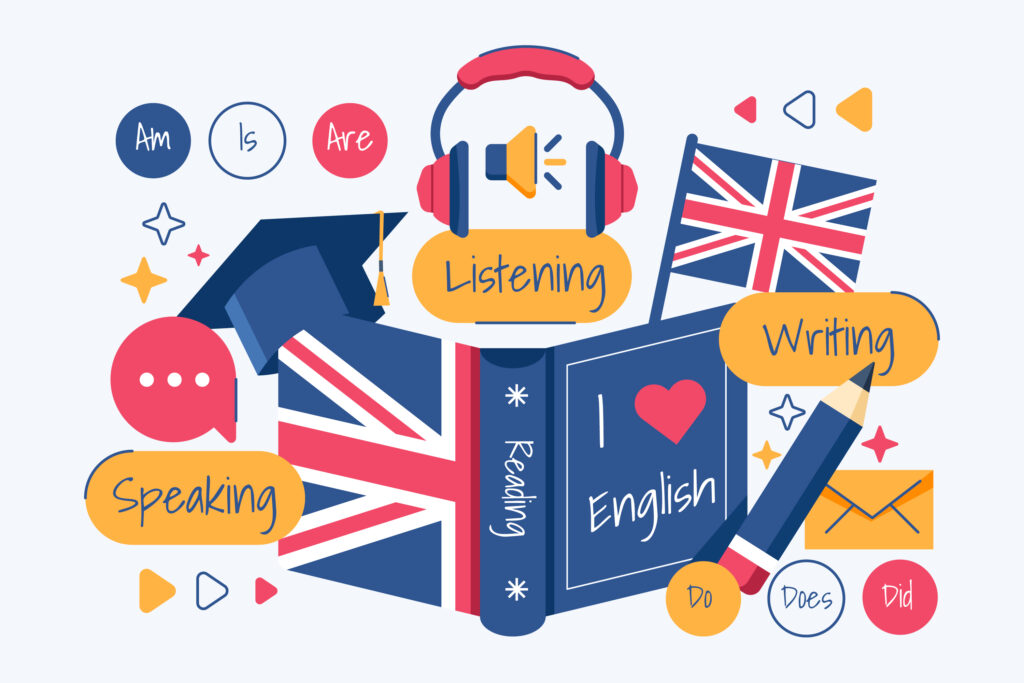English as a Second Language” (ESL) is a subject of interest for many people around the globe. To aid learners in their endeavors, there are tons of study resources, tutorials, and online communities available today. But with so many options.
It’s important to start fresh and let go of any preconceptions before beginning your English language learning journey. You give yourself the best chance of succeeding by going into your studies with a positive outlook and an open mind. Your experience learning a language can be greatly improved and made more enjoyable if you approach it with a positive attitude.
Here are our 10 Quick and Effective ways for Learning English:
1. Get Help from English Tutors:

Gaining assistance from English tutors can be a great way to advance your language abilities and accomplish your objectives. A tutor can give you the tools and techniques you need to communicate in English well while assisting you in speaking practice in a positive and encouraging environment. An English tutor can assist you in achieving your objectives, whether you’re a student hoping to raise your GPA, a working adult hoping to advance your career or just someone who wants to broaden their horizons.
Moreover, A tutor can develop good study habits and time management skills. They can provide you with tips and tricks for how to learn English effectively and efficiently, and help you set achievable goals, and track your progress over time. With the right tutor, you’ll be able to take your English skills to the next level, and achieve your full potential as a language learner.
2. Use Youtube and Website:

Learning English can be a challenging task, but learning English has gotten much simpler and more accessible with the aid of websites and online videos like YouTube. Anyone can brush up on their English from the comfort of their own home thanks to the vast amount of content available online.
YouTube is a great resource for learning English because it has a huge selection of videos on grammar, vocabulary, pronunciation, and conversation. There are countless channels devoted to teaching English that provide engaging and enjoyable lessons.
3. Embrace Mistakes in English Learning:

Making mistakes is a natural part of the learning process, and this is especially true when it comes to learning a new language like English.
Even native English speakers make mistakes, and the key is to learn from them and move forward. When you make a mistake, take it as a chance to ask questions and clarify any misunderstandings. By doing so, you’ll gain a deeper understanding of the language and be able to avoid making the same mistake in the future.
4. Listen to Some Podcasts, and Songs only in English:

You can practice your English while having fun by listening to podcasts and songs. Podcasts are audio programs that are available on a variety of platforms, such as iTunes and Spotify, and cover a wide range of topics. You can improve your listening and comprehension while simultaneously learning new vocabulary and expressions by listening to podcasts. Also available are podcasts with targeted lessons on grammar, pronunciation, and other topics that are made for English language learners.
Listening songs in English can also aid in your language-learning journey. Music is an excellent tool to immerse yourself in the language, and the catchy tunes and lyrics can make it easier for you to remember new vocabulary and expressions. Furthermore, you can use lyrics websites to look up words and phrases you don’t understand, which can help you expand your vocabulary and improve your comprehension. Singing along to English songs can also be beneficial for your pronunciation and intonation skills.
5. Don’t Translate in your Mind:

When learning a new language, it can be tempting to translate everything in your mind from your native language to English. However, this approach can actually hinder your language learning progress and prevent you from reaching fluency. Translation in your mind can slow down your thought process, making it difficult for you to communicate effectively in real-time situations. It also tends to rely heavily on grammar rules, which can result in a rigid and stilted way of speaking, lacking the natural flow of conversation.
It’s important to focus on understanding the meaning of the words and phrases you encounter, rather than just translating them into your native language. By doing so, you can improve your listening and comprehension skills, which are crucial for speaking and communicating in English.
6. Use your Friend for Practice:

If you have friends to practice English with can be an incredibly helpful and effective way to improve your language skills. Having a conversation with a native English speaker or someone who is fluent in English can provide you with a low-pressure environment to practice speaking and listening in English.
Your friend can also provide you with feedback on your language skills, helping you to identify areas where you need to improve. They can also give you advice on common mistakes that you make and offer suggestions for how you can improve. Additionally, having a friend to practice with can make language learning feel more like a social activity, rather than a chore, making it easier to stick with your language learning goals.
7. Use Tongue Twisters:

Tongue twisters are a fun and effective tool for improving your English skills. They are short phrases or sentences that are designed to be difficult to articulate, Thats makes them great for improving pronunciation, enunciation, and fluency. By practicing tongue twisters, you can challenge yourself to articulate sounds, words, and sentences more clearly, which can help you to become more confident and effective when speaking English.
Tongue twisters can also be a fun and interactive way to practice English with other people. You can challenge friends or classmates to repeat tongue twisters with you, or you can listen to native English speakers recite them and try to mimic their pronunciation which will improve your pronunciation. This can be a great way to improve your listening skills and pick up new tips and tricks for speaking English fluently. So why not try some tongue twisters today and start improving your English!
8. Read Books, Newspapers, and Articles in English:

It’s a great way to improve your English by Reading books, newspapers, and articles in English. It’s an excellent way to improve your English skills. By exposing yourself to a wide range of written English, you can develop a better understanding of grammar, vocabulary, and sentence structure. Reading can also help you to expand your knowledge of the English language and learn new words and expressions that you can use when speaking and writing in English.
Here are a few tips to help you read effectively for language learning:
- Choose materials that are appropriate for your level.
- Don’t be afraid to stop and look up words you don’t know.
- Don’t just passively read through the text, try to engage with it by asking yourself questions.
- Pay attention to grammar and sentence structure.
- As you read, take notes on new vocabulary words, grammar structures, and interesting topics.
9. Immerse Yourself in an English-speaking Environment:

Whenever you surround yourself with the language, you are constantly exposed to it and forced to use it in real-life situations. This type of exposure can assist you in learning the nuances of the language, that’s the way it will improve your listening and comprehension skills, and develop your speaking and writing abilities.
There are many ways to immerse yourself in an English-speaking environment. For example, you can travel to an English-speaking country, such as the United States, or the United Kingdom, or You can also join an English language exchange program or take classes at a language school. These programs will provide you with the opportunity to practice speaking and listening with native speakers.
10. Last but Most Important Practice, Practice, and Practice:

When it comes to learning English or any other language, practice is the most important factor. You can develop your skills, boost your confidence, and achieve your goals by practicing consistently and deliberately. Practice is essential for making real progress in the language, whether you are a beginner or an advanced learner.
It’s crucial to keep in mind that practice doesn’t have to be official or structured. In your daily activities, such as shopping, traveling, or placing an order at a restaurant, you can find opportunities to put the language into practice. These commonplace exchanges can offer beneficial chances to practice your language abilities and increase your fluency.
You’ll be on your way to mastering the English language in no time if you follow these ways. Remember to be gentle with yourself and to take advantage of every opportunity to practice and improve. You will achieve your goals and become proficient in English with dedication and hard work. Best wishes on your language-learning adventure!






0 Comments